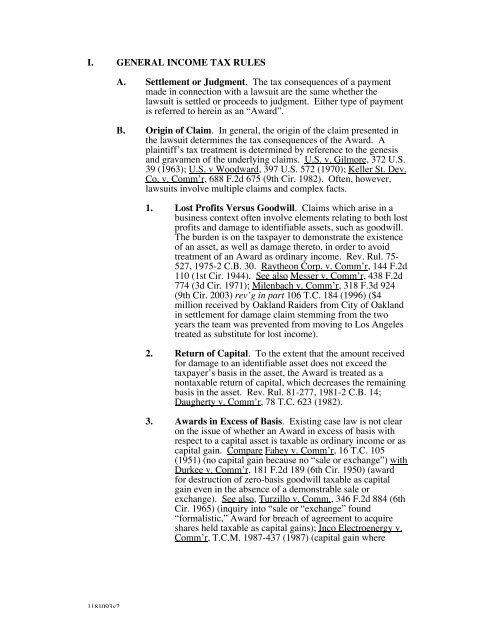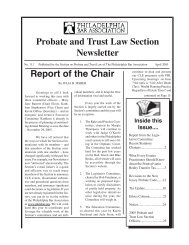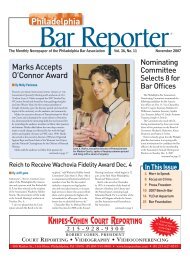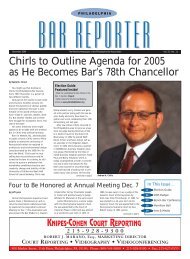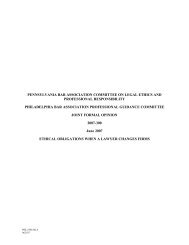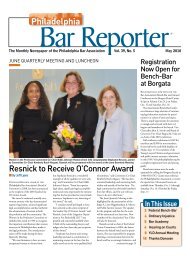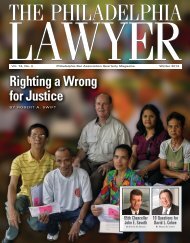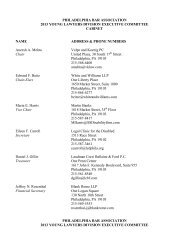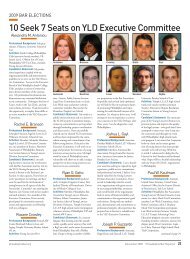Tax Aspects of Litigation Awards and Settlements - Philadelphia Bar ...
Tax Aspects of Litigation Awards and Settlements - Philadelphia Bar ...
Tax Aspects of Litigation Awards and Settlements - Philadelphia Bar ...
Create successful ePaper yourself
Turn your PDF publications into a flip-book with our unique Google optimized e-Paper software.
I. GENERAL INCOME TAX RULES<br />
A. Settlement or Judgment. The tax consequences <strong>of</strong> a payment<br />
made in connection with a lawsuit are the same whether the<br />
lawsuit is settled or proceeds to judgment. Either type <strong>of</strong> payment<br />
is referred to herein as an “Award”.<br />
B. Origin <strong>of</strong> Claim. In general, the origin <strong>of</strong> the claim presented in<br />
the lawsuit determines the tax consequences <strong>of</strong> the Award. A<br />
plaintiff’s tax treatment is determined by reference to the genesis<br />
<strong>and</strong> gravamen <strong>of</strong> the underlying claims. U.S. v. Gilmore, 372 U.S.<br />
39 (1963); U.S. v Woodward, 397 U.S. 572 (1970); Keller St. Dev.<br />
Co. v. Comm’r, 688 F.2d 675 (9th Cir. 1982). Often, however,<br />
lawsuits involve multiple claims <strong>and</strong> complex facts.<br />
1. Lost Pr<strong>of</strong>its Versus Goodwill. Claims which arise in a<br />
business context <strong>of</strong>ten involve elements relating to both lost<br />
pr<strong>of</strong>its <strong>and</strong> damage to identifiable assets, such as goodwill.<br />
The burden is on the taxpayer to demonstrate the existence<br />
<strong>of</strong> an asset, as well as damage thereto, in order to avoid<br />
treatment <strong>of</strong> an Award as ordinary income. Rev. Rul. 75-<br />
527, 1975-2 C.B. 30. Raytheon Corp. v. Comm’r, 144 F.2d<br />
110 (1st Cir. 1944). See also Messer v. Comm’r, 438 F.2d<br />
774 (3d Cir. 1971); Milenbach v. Comm’r, 318 F.3d 924<br />
(9th Cir. 2003) rev’g in part 106 T.C. 184 (1996) ($4<br />
million received by Oakl<strong>and</strong> Raiders from City <strong>of</strong> Oakl<strong>and</strong><br />
in settlement for damage claim stemming from the two<br />
years the team was prevented from moving to Los Angeles<br />
treated as substitute for lost income).<br />
2. Return <strong>of</strong> Capital. To the extent that the amount received<br />
for damage to an identifiable asset does not exceed the<br />
taxpayer’s basis in the asset, the Award is treated as a<br />
nontaxable return <strong>of</strong> capital, which decreases the remaining<br />
basis in the asset. Rev. Rul. 81-277, 1981-2 C.B. 14;<br />
Daugherty v. Comm’r, 78 T.C. 623 (1982).<br />
3. <strong>Awards</strong> in Excess <strong>of</strong> Basis. Existing case law is not clear<br />
on the issue <strong>of</strong> whether an Award in excess <strong>of</strong> basis with<br />
respect to a capital asset is taxable as ordinary income or as<br />
capital gain. Compare Fahey v. Comm’r, 16 T.C. 105<br />
(1951) (no capital gain because no “sale or exchange”) with<br />
Durkee v. Comm’r, 181 F.2d 189 (6th Cir. 1950) (award<br />
for destruction <strong>of</strong> zero-basis goodwill taxable as capital<br />
gain even in the absence <strong>of</strong> a demonstrable sale or<br />
exchange). See also, Turzillo v. Comm., 346 F.2d 884 (6th<br />
Cir. 1965) (inquiry into “sale or “exchange” found<br />
“formalistic,” Award for breach <strong>of</strong> agreement to acquire<br />
shares held taxable as capital gains); Inco Electroenergy v.<br />
Comm’r, T.C.M. 1987-437 (1987) (capital gain where<br />
1181093v2


